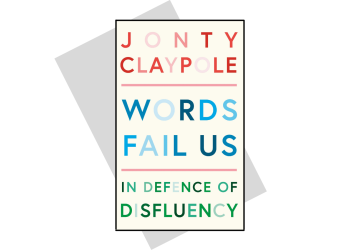

Book Review: 'Words Fail Us'
11th February 2021
Our Web Editor Steven reviews 'Words Fail Us: In Defence of Disfluency', a new book by Jonty Claypole that sheds a positive light on people with speech disfluencies. Scroll to the bottom to watch our interview with Jonty.
'Words Fail Us' by Jonty Claypole is a new book encouraging us to rethink the way we view speech disfluencies. It follows titles such as 'Stammering Pride & Prejudice' and artistic collectives like Hiatus in celebrating and promoting neurodiversity — a wider acceptance of these differences. (For interests of transparency, Claypole, who stammers himself, has just become a STAMMA Patron.) Scroll to the very bottom and watch our interview with Jonty.
The book's central premise is a bold one, putting language itself in the dock — or at least how it has developed in Western societies. Slick media productions and polished TED Talks present an 'ideal' way of communicating — one that worships fluency and excludes people who are disfluent. This, Claypole argues, has ultimately limited its scope, reduced its effectiveness and allowed for concealment, corruption and manipulation.
Over 310 pages he eloquently puts forward his case for how people who stammer, or have other speech disorders such as Tourette's, aphasia and dysarthria, have beneficial qualities that can remedy this and actually improve how we communicate.

The book opens where The King's Speech left off. Although that film did wonders for presenting a sympathetic portrayal of stammering, Claypole points out that it reinforced the notion that disfluency is unacceptable. He asks: why did it matter so much that the King was fluent?
He sets out to answer this by taking us on a tour through cultural history, going back to Ancient Greece and pinpointing the moment he believes the prejudice against speech disfluencies was born. He shows how attitudes were shaped over the next 3,000 years, with social and economic changes prompting people to aspire to fluency, and how this in turn created a demand for speech therapy.
Claypole points the finger squarely at Freud and his peers, whose theories about why people stammer embedded a stigma that we're still dealing with today.
Cue a potted history of how the medical world sought to treat stammering and find a cause, 'a catalogue of misguided diagnoses' culminating in the damaging dead end of psychoanalysis. Here Claypole points the finger squarely at Freud and his peers, whose theories about why people stammer embedded a stigma that we're still dealing with today.
Concluding that the medical world has failed to come up with real answers, Claypole instead points to the growing 'stammering pride' movement as offering hope in demolishing that stigma. It’s a concept he discovered on his quest to understand his own stammer, during one of the many enlightening interviews peppering the book that explore the experiences of people with disfluencies from all over the world. A growing number, he finds out, have pushed back and questioned things, inspired by the 'social model of disability' (for those unfamiliar with the social model, read our article 'A day exploring stammering pride'). He examines this and the implications it has for speech and language therapy.
Debates about whether or not stammering is a disability aside, the concept of viewing your own difference more positively and challenging society is gaining traction in the stammering world. Claypole gets on board and argues that talking more about our disfluencies, trying not to hide them, changing the language we use (the theme of our recent Find The Right Words campaign) and celebrating their benefits, is the most promising opportunity we have for changing perceptions and improving the experiences of people with speech disfluencies.
He brilliantly uses insights from his role in the arts (Claypole is the outgoing BBC Director of Arts) to provide evidence for these benefits. Here he lets rip, showing how notable writers, singers and rappers with speech disorders, from Lewis Carroll to Kendrick Lamar, have the power to enrich language and influence culture. This isn't limited to artists from the West — he introduces us to writers and thinkers from other parts of the world, which really adds fresh perspectives.
Claypole argues that talking more about our disfluencies, trying not to hide them, changing the language we use and celebrating their benefits, is the most promising opportunity we have for changing perceptions and improving the experiences of people with speech disfluencies.
In giving hope that change is possible, Claypole cites sign language and Creole as examples of how perceptions have shifted for those language systems. I would have liked to have seen a little more fleshing out of the argument here as to how accomplishing this might pan out for people who stammer. Greta Thunberg is presented as one example of how speech differences can cut through hollow rhetoric and make a difference; and social media is highlighted as a way of giving a voice to marginalised communities. But witnessing the amount of trolling Greta received online, one wonders how we can get past the polarisation and downright nastiness to differences that social media has arguably facilitated.
The more hard-line stammering pride activists might not think the book goes far enough in pressing for urgent change (and they might question the negative title — 'A case for' rather than 'In defence of' surely?). But like a barrister, Claypole cogently presents his case, showing us what he's found on his quest for self-understanding, and invites us to think about what we can do ourselves to help make a difference.
Jonty has an academic background, so I did have to reread a few sentences when he was summarising medical findings. But he is consistently engaging and informative — the book is packed with fascinating facts and historical micro-biographies that bring it to life. He sure did his research.
All in all, this is a highly entertaining and persuasive introduction to neurodiversity and stammering pride. For anyone who doesn't stammer it's also a fantastic all-encompassing overview of speech disorders and their history, describing the lived experiences perfectly and providing food for thought in this hyper-fluent world.
But it's also highly recommended to anyone who stammers. Whilst promoting stammering pride, Claypole fully acknowledges the devastating effects speech disfluencies can have and doesn't deny these negative experiences. But after reading his book you might just come away with a bit more hope, and start to think a little more positively about your stammer and your value to society.
'Words Fail Us: In Defence of Disfluency' is published by Profile Books and is available to buy on hardback and ebook now.
Watch our exclusive interview with Jonty below, in which we asked him all about the book.
































